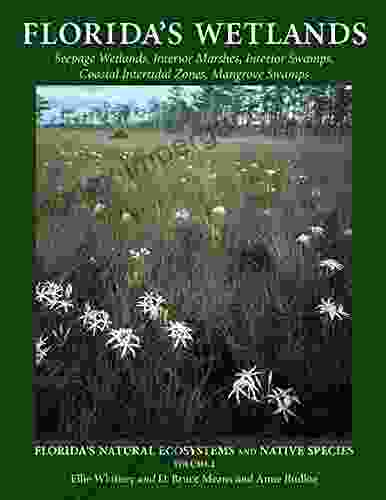Discover the Enchanting World of Florida Wetlands: A Comprehensive Guide to Native Ecosystems and Native Species

Florida, the Sunshine State, is renowned for its breathtaking natural beauty, and among its most captivating landscapes are its vast and diverse wetlands. From towering cypress swamps to glistening coastal marshes, these vibrant ecosystems play a crucial role in the state's ecological balance and support an extraordinary array of native species.
4.9 out of 5
| Language | : | English |
| File size | : | 70722 KB |
| Text-to-Speech | : | Enabled |
| Enhanced typesetting | : | Enabled |
| Print length | : | 178 pages |
| Screen Reader | : | Supported |
In this comprehensive guide, we delve into the enchanting world of Florida wetlands, exploring their unique ecosystems and the remarkable species that call them home. Join us as we unveil the intricate tapestry of life that thrives within these vital habitats, showcasing their ecological significance and the urgent need for their conservation.
The Enchanting Ecosystems of Florida Wetlands
Florida's wetlands are a mosaic of interconnected ecosystems, each with its own distinct characteristics and ecological functions. These ecosystems include:
- Cypress Swamps: Dominated by towering cypress trees, these swamps are characterized by their dark, tannin-stained waters and a rich understory of vegetation. They provide habitat for a diverse array of wildlife, including alligators, crocodiles, turtles, and a variety of bird species.
- Wet Prairies: These vast, grassy wetlands are home to a variety of wading birds, including herons, egrets, and ibises. They also support a rich diversity of amphibians, reptiles, and mammals.
- Coastal Marshes: Found along the state's coastlines, these marshes are dominated by salt-tolerant plants and provide habitat for a variety of marine and estuarine species, including fish, shellfish, and shorebirds.
- Mangrove Forests: These unique ecosystems are found along the state's southern coastlines and are dominated by mangrove trees, which have adapted to the salty, brackish waters. Mangrove forests provide important habitat for a variety of marine species, including fish, crabs, and birds.
The Incredible Native Species of Florida Wetlands
Florida's wetlands support a stunning array of native species that have adapted to the unique conditions of these ecosystems. These species include:
- Alligators and Crocodiles: These large reptiles are apex predators in many wetland ecosystems, preying on a variety of aquatic animals. Alligators are found throughout the state, while crocodiles are primarily found in coastal areas.
- Wading Birds: Florida's wetlands are home to a diverse array of wading birds, including herons, egrets, and ibises. These birds use their long legs and beaks to hunt for fish, frogs, and other aquatic prey.
- Shorebirds: These birds inhabit the coastal marshes and beaches of Florida. They feed on a variety of small invertebrates, such as crabs, worms, and mollusks.
- Turtles: Several species of turtles, including the gopher tortoise and the alligator snapping turtle, are found in Florida's wetlands. These turtles play an important role in the ecosystem, helping to control plant growth and providing food for other animals.
- Mammals: A variety of mammals, including otters, bobcats, and black bears, inhabit Florida's wetlands. These mammals rely on the wetlands for food, water, and shelter.
The Ecological Significance of Florida Wetlands
Florida's wetlands provide a multitude of ecological benefits, including:
- Water Filtration: Wetlands act as natural filters, removing pollutants from water and improving water quality.
- Flood Control: Wetlands help to reduce flooding by absorbing and storing excess water during heavy rains or storms.
- Habitat for Wildlife: Wetlands provide critical habitat for a wide range of wildlife, including many threatened and endangered species.
- Carbon Sequestration: Wetlands store large amounts of carbon, helping to mitigate climate change.
Threats to Florida Wetlands
Florida's wetlands face a variety of threats, including:
- Development: The rapid development of Florida has led to the loss and degradation of many wetlands.
- Pollution: Runoff from agricultural and urban areas can pollute wetlands, harming wildlife and degrading water quality.
- Climate Change: Sea level rise and changes in precipitation patterns are threatening coastal wetlands and the species that depend on them.
Conserving Florida's Wetlands
It is essential to protect and conserve Florida's wetlands to ensure their continued ecological benefits and the survival of the species that depend on them. Conservation efforts include:
- Land Acquisition: Acquiring land for conservation can help to protect wetlands from development.
- Restoration: Restoring degraded wetlands can help to improve water quality, provide habitat for wildlife, and reduce flooding.
- Education: Educating the public about the importance of wetlands can help to generate support for conservation efforts.
Florida's wetlands are a vital part of the state's natural heritage, providing numerous ecological benefits and supporting a rich diversity of native species. However, these wetlands face a variety of threats, and it is essential to take action to protect and conserve them for future generations.
4.9 out of 5
| Language | : | English |
| File size | : | 70722 KB |
| Text-to-Speech | : | Enabled |
| Enhanced typesetting | : | Enabled |
| Print length | : | 178 pages |
| Screen Reader | : | Supported |
Do you want to contribute by writing guest posts on this blog?
Please contact us and send us a resume of previous articles that you have written.
 Book
Book Novel
Novel Page
Page Chapter
Chapter Text
Text Story
Story Genre
Genre Reader
Reader Library
Library Paperback
Paperback E-book
E-book Magazine
Magazine Newspaper
Newspaper Paragraph
Paragraph Sentence
Sentence Bookmark
Bookmark Shelf
Shelf Glossary
Glossary Bibliography
Bibliography Foreword
Foreword Preface
Preface Synopsis
Synopsis Annotation
Annotation Footnote
Footnote Manuscript
Manuscript Scroll
Scroll Codex
Codex Tome
Tome Bestseller
Bestseller Classics
Classics Library card
Library card Narrative
Narrative Biography
Biography Autobiography
Autobiography Memoir
Memoir Reference
Reference Encyclopedia
Encyclopedia Bruce C Brown
Bruce C Brown Brent Zimmerman
Brent Zimmerman Bowe Packer
Bowe Packer Paul Michael Kurtz
Paul Michael Kurtz Brian Davies
Brian Davies Ron Tanner
Ron Tanner Edward Ellsberg
Edward Ellsberg C B Garris
C B Garris Branden James
Branden James Francette Pacteau
Francette Pacteau Bryn D Davis
Bryn D Davis Charles Adkins
Charles Adkins Sylvie Benguigui
Sylvie Benguigui Chris A Rutkowski
Chris A Rutkowski Brian Cudnik
Brian Cudnik C R May
C R May Bret Nicholaus
Bret Nicholaus Victor R Savage
Victor R Savage Bonnie Ruberg
Bonnie Ruberg Keith S Delaplane
Keith S Delaplane
Light bulbAdvertise smarter! Our strategic ad space ensures maximum exposure. Reserve your spot today!
 Heath PowellFollow ·6k
Heath PowellFollow ·6k Carlos FuentesFollow ·19.4k
Carlos FuentesFollow ·19.4k Andrew BellFollow ·11.1k
Andrew BellFollow ·11.1k Angelo WardFollow ·19.3k
Angelo WardFollow ·19.3k Dwight BlairFollow ·2.8k
Dwight BlairFollow ·2.8k Levi PowellFollow ·18.8k
Levi PowellFollow ·18.8k José MartíFollow ·3.8k
José MartíFollow ·3.8k Amir SimmonsFollow ·10.9k
Amir SimmonsFollow ·10.9k

 Gary Cox
Gary CoxUnlocking Meaning and Purpose in Life: An Exploration of...
In an increasingly...

 Eric Hayes
Eric HayesMemoirs of the Early Pioneer Settlers of Ohio Illustrated
A Window into the Lives of Courageous...

 J.R.R. Tolkien
J.R.R. TolkienThe Montgomerys and Their Descendants: A Saga of Courage,...
Prepare to be...

 Avery Simmons
Avery SimmonsThe Rifle Musket: The Dawn of Modern Infantry Warfare
: The rifle musket, a revolutionary...

 Jesse Bell
Jesse BellUnlock the Power of Excel with VBA and Macros: A...
Microsoft Excel is a powerful spreadsheet...
4.9 out of 5
| Language | : | English |
| File size | : | 70722 KB |
| Text-to-Speech | : | Enabled |
| Enhanced typesetting | : | Enabled |
| Print length | : | 178 pages |
| Screen Reader | : | Supported |














